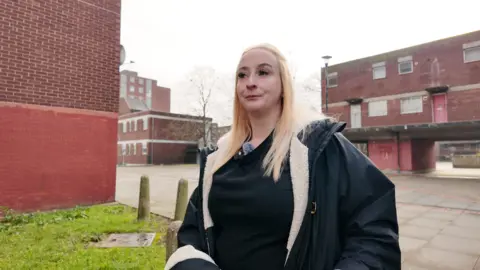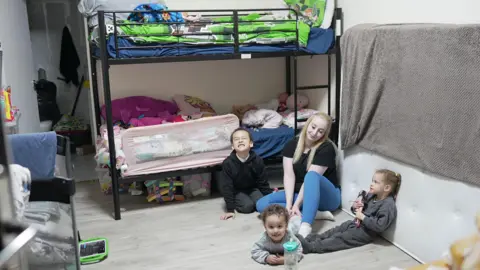Welcome for housing pledge - but is it too late for some?
 BBC
BBCDanielle has moved four times in the last nine months with her three children.
They became homeless after receiving a section 21 "no fault" eviction order from their landlord, and since then their local council has placed them in a shared house, as well as in hotel rooms.
Despite the government's promises to fund more affordable and social housing, Danielle told the BBC she doesn't expect a council house to become available "any time soon".
In Wednesday's Spending Review, Chancellor Rachel Reeves announced her plan to deliver the government's manifesto pledge to build 1.5 million new homes this parliament.
The government committed to spend £39bn across 10 years for social and affordable housing in England - a move described by many social landlords and housing charities as a game-changer.
Many parts of the country currently face an acute shortage of affordable and social housing. London's social housing waiting lists are at a 10-year high, according to analysis of government data by London Councils published earlier this year.
The government says this investment, amounting to an average of £3.9bn a year, will be "significantly higher than what the previous government spent on affordable housing, which was an average of £2.3bn per year".
Affordable housing is a wide-ranging category which includes properties let at rents of no more than 80% of local market rates, as well as shared ownership homes and social rent properties which are set at about 50% of market levels.
More detail - including where the homes will be built, who will build them, and how much funding will be allocated to building socially rented homes - is still awaited.
Danielle, who first got in touch through Your Voice, Your BBC News, says the government's announcement feels "too late" to help her family now - but she hopes it means better chances for her children in the future.
For her a permanent home "would be everything, everything".
"It's security for my children, it's to know that we are never going to be put in a position like this again."
Being moved every few weeks has been extremely disruptive.
"It's been awful, absolute hell, it's turned all of our lives upside down. My children are constantly having to readapt."
She has now been moved to temporary accommodation 18 miles from their school.
"My children have to be up so early, at 5am, and then are expected to give 100% at school."

You could almost hear the sigh of relief from social landlords when the billion-pound housing investment was announced.
Many had warned that without significant funding and certainty, the government would never reach its housebuilding target.
The government has also guaranteed how much social landlords will receive in rents over the next 10 years, meaning housing associations can plan how much they have to invest in building.
Kate Henderson, head of the National Housing Federation, described the announcement as "transformational" and "the most ambitious Affordable Homes Programme we've seen in decades".
Charlie Trew, head of policy at Shelter, agrees this is a "a really big moment" for the sector, but said the government needs to set a "clear target" for exactly how many social rent homes are planned.
"The issue with so-called 'affordable housing' is that often it's not affordable at all and priced out of reach of people on low incomes," Mr Trew told the BBC.
Shelter analysis shows that in more than four in 10 local authorities in England, a one-bed "affordable rent" home is "unaffordable for an individual on low pay", Mr Trew added.
For this reason, he said it was important for the government to set a social rent target that would "focus this funding on social rent so that the cash delivers genuinely affordable social rented homes with rents tied to local incomes."
Meanwhile, housebuilders said that while the announcement was good news in the long term, they were hoping for a boost now for the wider housing sector - such as a reintroduction of the help-to-buy scheme.
Neil Jefferson, CEO at the Home Builders Federation, said that a year into the new parliament, housing supply and investment were "still lagging well behind where they should be".
"This will likely persist until government grapples with the challenges being faced by prospective first-time buyers trying to get on the housing ladder," he said.
